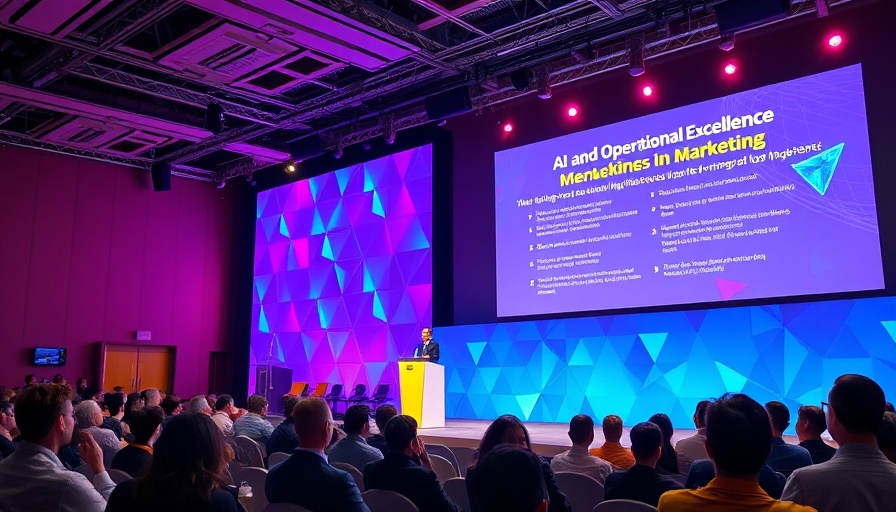
Harnessing AI for Strategic Marketing Growth
During the recent Adobe Summit, Hilary Cook, VP of Global Marketing Operations at Marriott International, sparked a vital conversation around the intersection of artificial intelligence (AI) and operational excellence in marketing. Her emphasis on AI as a crucial amplifier rather than a quick-fix solution resonated deeply with attendees, challenging them to reconsider their traditional approaches to marketing strategy.
The Ready or Not of AI Adoption
Cook's keynote began with a pertinent question: "Where do we start?" For many organizations today, AI seems like a futuristic tool to tackle current marketing challenges. However, she highlighted a significant truth: technology cannot resolve inefficiencies, fragmented data, and poor alignment without first addressing foundational issues. Companies must perform a readiness assessment to understand their current operational state before they can leverage AI effectively.
Four Pillars of Effective Digital Transformation
As part of her recommendations, Cook outlined four essential pillars crucial for marketers aiming to harness AI effectively:
- Documented Process Flows: Grasping how marketing operations function is vital for accountability and efficiency.
- Clear Data Flows & Definitions: This ensures accurate insights that inform critical business decisions.
- Fit-to-Purpose Marketing System Architecture: Establishing purpose-driven frameworks is necessary before implementing new tools.
- Clear Accountability: Transparency within workflows is fundamental to eliminate redundant efforts and inefficiencies.
Revealing the Complexities: A Case Study
A particularly enlightening moment in Cook’s address was her analysis of Marriott’s internal process audit. By detailing how their marketing initiatives flowed from conception to execution, she uncovered staggering inefficiencies:
- 39 steps in a single workflow
- 45 interdependent processes across various teams
- 43 intake artifacts, with 41 being duplicative
This analysis emphasized a crucial point: without visibility into inefficiencies, teams often work against each other, leading to disruptions and confused efforts. Optimizations lacking a holistic perspective tend to reinforce systemic issues.
The Necessity of Executive Alignment
Cook also underscored the importance of executive alignment in driving marketing changes. When leaders understand and commit to operational excellence, it fosters an environment where teams can collaborate effectively and implement strategies that leverage AI responsibly and sustainably.
Comparative Insights from Today's Market
A recent study by the Harvard Business Review echoed Cook's insights, revealing that organizations implementing AI without addressing operational inefficiencies saw returns diminishing over time. Market leaders are now focusing on integrative strategies that combine AI's potential with robust operational practices, underscoring that success in marketing technology demands both innovation and discipline.
Practical Applications and Next Steps
For business owners and marketing professionals eager to harness AI in a meaningful way:
- Begin with an Assessment: Conduct a thorough evaluation of current processes and readiness for AI.
- Invest in Training: Ensure your teams understand the tools you are investing in and can leverage them correctly.
- Pursue Holistic Strategies: Focus on integration rather than isolated improvements to drive long-term efficiency and growth.
By implementing these actionable insights, businesses can prepare themselves for a future where AI plays a pivotal role in marketing strategy.
Engage With Us
As the landscape of marketing continues to evolve rapidly, it is crucial for leaders to stay informed and adaptable. Use the insights from Cook's keynote to innovate your marketing strategies and lead your organization into a future where operational excellence goes hand-in-hand with cutting-edge technology.
 Add Row
Add Row  Add
Add 






Write A Comment